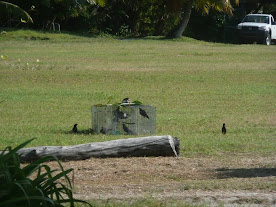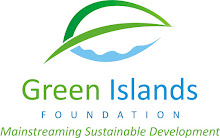The granitic Seychelles are situated on the Mahe Plateau an enormous
bank of some 12,000 square miles in the western Indian Ocean. The Mahe
Plateau is shallow, on average around 50 metres in depth, and abounds
with life. At the “drop-off”, where the shelf falls away rapidly into
the abyss, cool “upwellings” of nutrient rich water spawn chains of life
from algal blooms, through krill to tuna, sword fish, sharks and
whales. The shallow waters of the plateau are dotted with patch reefs
whilst larger fringing reefs occur around the islands.
The Mahe plateau is central to Seychelles development and economy. It has since first settlement of the islands, in 1770, provided the population with high quality, affordable protein and the artisanal fishery continues to be a major contributor to the local economy and export balance. The health of the coastal ecosystem is therefore central to the socioeconomic stability and sustainable development of the country.
The early explorers and first settlers of the Seychelles archipelago recorded abundant fishery resources around the islands and along the “drop –off” – in particular they noted the great abundance and variety of sharks that teamed in the waters. This was prime evidence of a very rich and productive ecosystem. Sadly the shark stocks of the Mahe plateau have been greatly reduced with the first major declines being driven by a schooner-based targeted shark fishery in the 1940s – 1960s. Shark catch as a percentage of the overall artisanal catch has fallen by an order of magnitude over the last 80 years (Nevill, J. 2005).
Species regularly caught by fishers however, indicate that the plateau still supports a good diversity of species for at least part of their respective lifecycles and hence good management regimes have the potential to increase future populations and catches.
Sharks however, are more significant than merely a source of protein, as they play a key ecosystem role. All heterotrophs by definition rely on other living organisms for food. Feeding/predator-prey relationships provide the framework for ecosystem structure and function. If all the lions, leopards and cheetah were removed from the Serengeti one could expect a significant cascading effect on the ecosystem and possibly a phase-shift to another stable equilibrium. Although the dynamics of marine ecosystems are less well understood – the same principles can be applied and indeed fishing down of predators is considered the driving force behind the collapse in Caribbean coral reef ecosystems and the decline in Alaskan Kelp forests.
Now clearly it is more complex than that as food-web relationships work in both directions, top-down and bottom-up but nevertheless managing the coastal shark fishery such that viable shark populations are retained to fulfill their ecological role is an important factor in maintaining a healthy, diverse and productive coastal ecosystem that provides environmental services and supports other artisanal fishery activities.
As mentioned in the previous post, below, the Government of Seychelles published, in 2007, its National Plan of Action for the Conservation and Management of Sharks (NPOA) (Nevill, J. 2007) thereby addressing its commitment under the FAO International Plan of Action.
One of the key limiting factors restricting effective management of the shark fishery is a lack of information on the catch and in particular its species content by the various fisheries. The GIF-MFF project seeks to help address this information shortfall by providing the tools and developing the capacity for artisanal shark fishermen (ASF)to start collecting their own fishery data.
The project is now under way with preliminary meetings with ASF on Mahe initiated and ongoing and the first field trip to the Seychelles second island of Praslin scheduled for the coming weekend.
Updates will be posted periodically so please do check back for news on the project’s progress… (Contributed by John Nevill).
Refs:
Nevill, J. (2005). Establishing a baseline for Shark fishery management in the Seychelles. MSc in Coastal Management. University of Newcastle upon Tyne, UK.
Nevill, J. (2007). Seychelles National Plan of Action for the Conservation and Management of Sharks. Seychelles Fishing Authority.
The Mahe plateau is central to Seychelles development and economy. It has since first settlement of the islands, in 1770, provided the population with high quality, affordable protein and the artisanal fishery continues to be a major contributor to the local economy and export balance. The health of the coastal ecosystem is therefore central to the socioeconomic stability and sustainable development of the country.
The early explorers and first settlers of the Seychelles archipelago recorded abundant fishery resources around the islands and along the “drop –off” – in particular they noted the great abundance and variety of sharks that teamed in the waters. This was prime evidence of a very rich and productive ecosystem. Sadly the shark stocks of the Mahe plateau have been greatly reduced with the first major declines being driven by a schooner-based targeted shark fishery in the 1940s – 1960s. Shark catch as a percentage of the overall artisanal catch has fallen by an order of magnitude over the last 80 years (Nevill, J. 2005).
Species regularly caught by fishers however, indicate that the plateau still supports a good diversity of species for at least part of their respective lifecycles and hence good management regimes have the potential to increase future populations and catches.
Sharks however, are more significant than merely a source of protein, as they play a key ecosystem role. All heterotrophs by definition rely on other living organisms for food. Feeding/predator-prey relationships provide the framework for ecosystem structure and function. If all the lions, leopards and cheetah were removed from the Serengeti one could expect a significant cascading effect on the ecosystem and possibly a phase-shift to another stable equilibrium. Although the dynamics of marine ecosystems are less well understood – the same principles can be applied and indeed fishing down of predators is considered the driving force behind the collapse in Caribbean coral reef ecosystems and the decline in Alaskan Kelp forests.
Now clearly it is more complex than that as food-web relationships work in both directions, top-down and bottom-up but nevertheless managing the coastal shark fishery such that viable shark populations are retained to fulfill their ecological role is an important factor in maintaining a healthy, diverse and productive coastal ecosystem that provides environmental services and supports other artisanal fishery activities.
As mentioned in the previous post, below, the Government of Seychelles published, in 2007, its National Plan of Action for the Conservation and Management of Sharks (NPOA) (Nevill, J. 2007) thereby addressing its commitment under the FAO International Plan of Action.
One of the key limiting factors restricting effective management of the shark fishery is a lack of information on the catch and in particular its species content by the various fisheries. The GIF-MFF project seeks to help address this information shortfall by providing the tools and developing the capacity for artisanal shark fishermen (ASF)to start collecting their own fishery data.
The project is now under way with preliminary meetings with ASF on Mahe initiated and ongoing and the first field trip to the Seychelles second island of Praslin scheduled for the coming weekend.
Updates will be posted periodically so please do check back for news on the project’s progress… (Contributed by John Nevill).
Refs:
Nevill, J. (2005). Establishing a baseline for Shark fishery management in the Seychelles. MSc in Coastal Management. University of Newcastle upon Tyne, UK.
Nevill, J. (2007). Seychelles National Plan of Action for the Conservation and Management of Sharks. Seychelles Fishing Authority.

























No comments:
Post a Comment